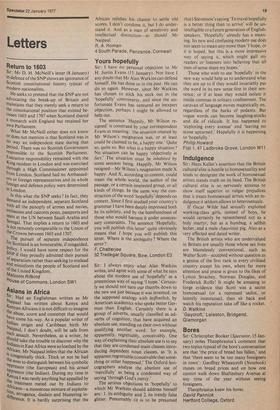Return to 1603
Sir: Mr D. H. McNeill's letter (8 January) in defence of the SNP shows an ignorance of Scottish constitutional history typical of modern nationalists.
He seeks to pretend that the SNP are not advocating the break-up of Britain and maintains that they merely seek a return to the constitutional position that existed between 1603 and 1707 when Scotland shared a monarch with England but retained her OW n Parliament.
What Mr McNeill either does not know or does not mention is that Scotland was in 110 way an independent state during that Period. There was no Scottish Government responsible to the Scottish Parliament. Executive responsibility remained with the King resident in London and was exercised through a High Commissioner appointed from London. Scotland had no Ambassadors or foreign representatives and its whole foreign and defence policy were determined in London.
Is this what the SNP seeks? In fact, they demand an independent, separate Scotland with all the panoply of armies and navies, embassies and customs posts, passports and seats at the UN between Saudi Arabia and Senegal. That implies a return to 1603 and IS not remotely comparable to the Union of the Crowns between 1603 and 1707.
_ The pursuit of separate independence for Scotland is an honourable, if misguided. Policy. I would have some respect for the SNP if they proudly admitted their pursuit of separatism rather than seeking to mislead and misinform the people of Scotland and of the United Kingdom.
Malcolm Rifkind House of Commons, London SW1


































 Previous page
Previous page